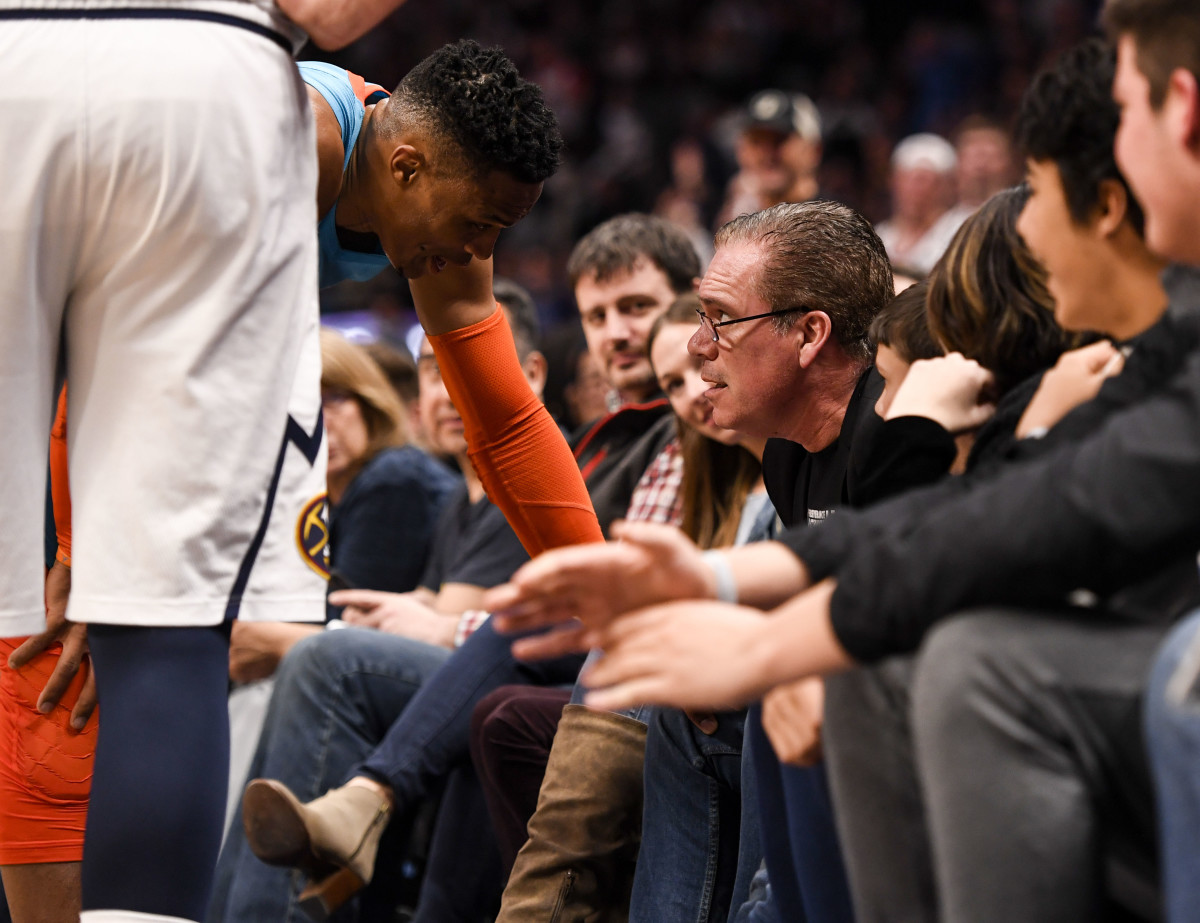Russell Westbrook and Why the Jazz Fan Had to Be Banned

After Russell Westbrook's verbal altercation with a fan in Utah Monday night, there was immediate support from around the NBA and within his locker room. "At the end of the day," OKC teammate Raymond Felton said, we are human beings. We have feelings. Just like they got feelings, we got feelings, too. That was unnecessary what they said to Russ. That's not fair. People can say whatever they want to say to us during the games, talk about our families, talk about kids. We are fathers, we have families ... (and) the security was standing right there. He never said one thing. He didn't say one word. That's not right."
The Jazz had to take action this week. No fan in any NBA city should be able to verbally harass a player and tell him to get on his knees without being banned by security or at least shamed by fellow fans. If the same standard wasn't applied in Utah, it's on the team to fix it. Donovan Mitchell expressed similar sentiments in his statement Tuesday. And ultimately, the Jazz conveyed the same message. Late Tuesday afternoon, the team announced that the season-ticket holder has been banned for life after an investigation found he directed "excessive and derogatory verbal abuse" at an opposing team's player.
Westbrook crossed the line in his response, and that's why he was fined. The language here was pretty shocking when I first saw the video Monday night. Even if he was provoked, NBA players are paid massive amounts of money, and exercising restraint in the face of loudmouth morons is part of the deal. The NBA cares about maintaining a baseline of decorum between players and fans, and fining Westbrook is a concession to that ideal. And, of course, if this incident happened under David Stern 15 years ago, Westbrook almost certainly would have been suspended for the same reasons.
It's telling that Adam Silver's league office didn't go that far. The NBA is exercising restraint, too, and that's the correct decision. It's possible to acknowledge that superstars are paid to show restraint while still empathizing when they fall short of that goal.

Westbrook's altercation came at the end of a month-long debate on player rights, media resentment, and the correlation between social media and the general happiness of today's players. None of those conversations are easily resolved, and reasonable people can disagree. Silver's observations about his unhappy players seem surprisingly perceptive and honest, but Charles Barkley's not necessarily wrong, either.
One development is undeniable: NBA players are commodified and objectified today more than ever. The business of being an NBA star happens on social media and on TV, but also in the middle of games, amid of a sea of strangers, with a dozen cameras trained on every move they make. Couple those interactions with near-constant media responsibilities, and pro basketball players today are dealing with a level of fame and exposure that would have been foreign to someone like Barkley. Basketball is now a sport where amateur lip-reading from people on Twitter leads to real questions from reporters during media availability. It's kind of mind-boggling.
None of this is to say that being an NBA superstar is suddenly a losing bargain. Players make more money than ever—Westbrook's will earn $35,654,150 this year—and many of them actively embrace the idea that they are a commodity. As Anthony Davis said on a recent episode of LeBron James's show The Shop, "As a player, as the C.E.O. of my own business, I got the power." Today's NBA stars enjoy more freedom and leverage than any athletes in team sports. It's been a great deal for almost everyone involved.
Nevertheless, it's a little disingenuous to pretend that players are crazy for doing a double take at some of today's dynamics. As basketball continues to grow in the internet era, the NBA creates the most marketable superstars in sports, but it also leaves those same stars perpetually scrutinized across several different platforms. Media serves an audience that will devour rumors and psychoanalysis all year-round, the internet amplifies the noise to unprecedented degrees, and a majority African-American league remains chronicled by mostly white reporters, for mostly white fans. Even if this is nobody's fault, and even if this economy is mutually beneficial for the league and players alike, on the wrong day, all of it can look alienating.
The least the league can do is make sure that games themselves are free from dehumanizing language and invasions of player privacy. Policing fan behavior is one area where teams and the league lose almost nothing if they decide to over-correct on behalf of the players. Any fan who appears to be crossing the line should be dealt with decisively, and standards should be clear all over the league. I would say more, but I'm not sure there's anyone credible who actually disagrees: if there's any gray area about fan behavior and the proper response, the benefit of the doubt should go to the players who are asked to sell this sport every night, all year long.
Tuesday's decisions from the NBA and the Jazz seemed to confirm that everyone around the sport is on the same page. And for all the debates and existential concerns that have consumed the NBA over the past month, the resolution in Utah was oddly refreshing. There is at least one point on which everyone can agree.
